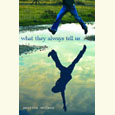The Descent of Man
Barbara Kingsolver’s Unsheltered tells parallel stories of desperate families
The primary setting of Barbara Kingsolver’s Unsheltered is a three-story brick house, at once grand and dilapidated, in the village of Vineland, New Jersey. Two families, alike in desperation, inhabit the house—one in the 1870s, the other in 2016. The house’s precarious state symbolizes a sense, in both eras, that the world is about to crumble. Vineland is the U.S. in microcosm: a town cloaked in Christian virtue but actually run by a small plutocracy.

In 2016, Willa Knox has every reason to feel she’s been shafted by the political system, but her material misfortunes mirror more cosmic complaints. A journalist who has worked hard to establish her career, Willa loses her job when the magazine she worked for goes bankrupt. Her husband, Iano, a tenured professor, is also cashiered when his college shuts its doors. After Willa’s mother passes away, they inherit the Vineland house, more of a sinking ship than a lifeboat. Because misery ineluctably attracts company, they are joined by Iano’s frail father, Nick, and their own two grown children—their daughter, Tig, is an idealist; their Ivy League-educated son, Zeke, is both unemployed and a new father.
In Unsheltered’s 1870s thread, Thatcher Greenwood moves to Vineland with a new wife and a hard-to-please mother-in-law, only to find that his teacher’s salary cannot match his wife’s expensive tastes. A biologist and an early adopter of Darwin’s theories, Thatcher finds his job in danger when he runs afoul of his school’s principal, a Biblical literalist. He finds more congenial company in his neighbor Mary Treat, a historical figure who carried out independent scientific research in Vineland and corresponded with luminaries such as Asa Gray and Darwin himself. Mary’s personal forbearance and progressive ideals provide the book’s one sustained note of optimism.
Kingsolver’s title allows for both literal and metaphorical readings. Cracks in the walls of their old house expose Willa and her family to the frozen New Jersey winter, evoking a primordial recognition of their vulnerability. But Thatcher remembers his own impoverished childhood “in a grimy, unsheltered family,” until the exigencies of the Civil War allowed him to rise and pursue an education. For him, exposure is positive: he exposes his students to new ways of understanding the world. It’s his duty to help them “see evidence for themselves” and “stand in the clear light of day,” he says. “Unsheltered.”
 Kingsolver alternates chapters between the two stories, usually allowing readers to construe historical parallels for themselves. On key political points, though, she makes the connections brutally clear. Thatcher trembles at the prospect of teaching Darwin when “half the world, with no understanding of Darwin at all, will rally around whoever calls him a criminal and wants him hanged.” He recalls a market square in Boston when Darwin was hanged in effigy, “the murderous crowd chanting Lock him up!” Mary believes such behavior is simply human nature: “When men fear the loss of what they know, they will follow any tyrant who promises to restore the old order.”
Kingsolver alternates chapters between the two stories, usually allowing readers to construe historical parallels for themselves. On key political points, though, she makes the connections brutally clear. Thatcher trembles at the prospect of teaching Darwin when “half the world, with no understanding of Darwin at all, will rally around whoever calls him a criminal and wants him hanged.” He recalls a market square in Boston when Darwin was hanged in effigy, “the murderous crowd chanting Lock him up!” Mary believes such behavior is simply human nature: “When men fear the loss of what they know, they will follow any tyrant who promises to restore the old order.”
In a similar vein, Vineland’s blue-collar workers resist the obvious truth that their “great captain,” founder Charles Landis, effectively “indentures them and eats their souls and property.” Unlikely ever to raise their families out of grinding poverty, they “are happier to think of themselves as soon to be rich than irreversibly poor.”
Kingsolver balances intimate portrayals of domestic tribulations with a global vision of the world’s manifold ironies. Iano lectures on the relationship between economic inequality and political unrest but is powerless to stop his family’s slide out of the bourgeoisie. Zeke plans to start a hedge fund called Good Money, which will invest in eco-friendly businesses that don’t exploit labor, a strange amalgamation of capitalism and altruism. Tig, the novel’s least materialistic character, thrives despite her family’s hardships because a transformative experience in Cuba recalibrated her value system. Still, she would readily pay someone to fix the house’s defective heating.
Kingsolver’s characters, resilient and unbroken, grab our sympathies and earn our admiration. They allow themselves momentary expressions of exasperation—“What’s going to happen to us?” Willa asks—but quickly return to the business of living. Comforts are few, but Thatcher and Willa both find sustenance in the contemplation of nature, as does the heroine of Kingsolver’s earlier novel Flight Behavior. Wise and moving, Unsheltered celebrates the bravery of animals, human and otherwise, who throw themselves into unknown territories to construct new homes.

Sean Kinch grew up in Austin and attended Stanford. He earned a Ph.D. from the University of Texas. He now teaches English at Montgomery Bell Academy in Nashville.


